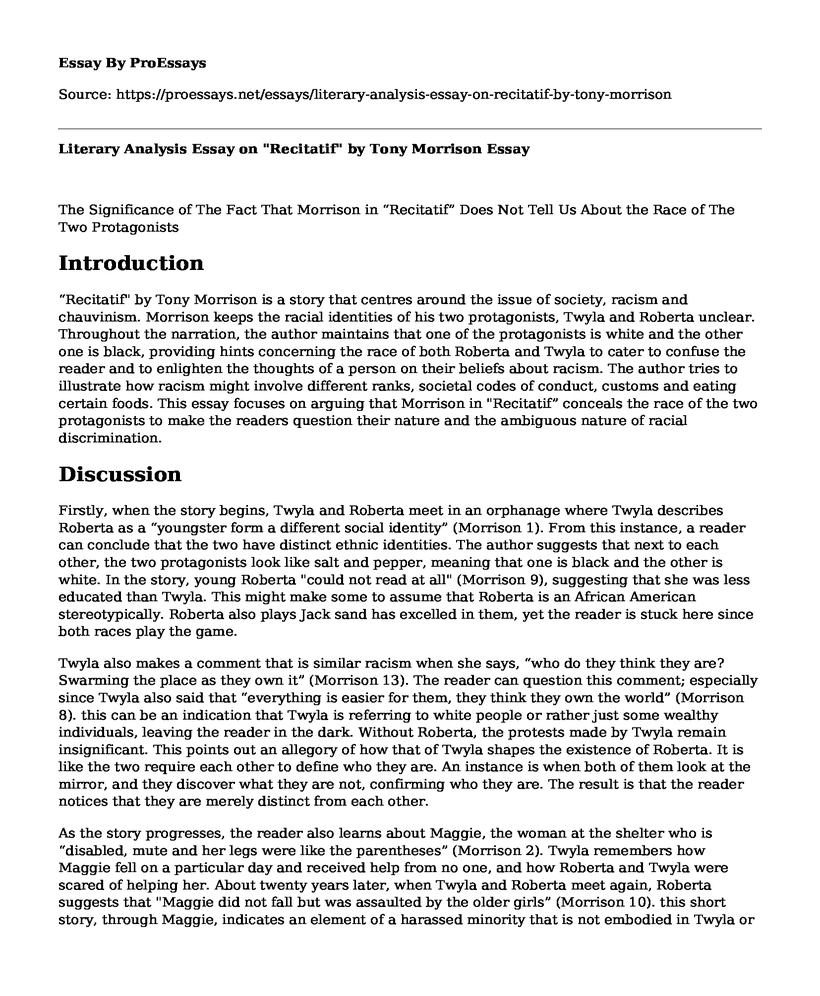The Significance of The Fact That Morrison in “Recitatif” Does Not Tell Us About the Race of The Two Protagonists
Introduction
“Recitatif" by Tony Morrison is a story that centres around the issue of society, racism and chauvinism. Morrison keeps the racial identities of his two protagonists, Twyla and Roberta unclear. Throughout the narration, the author maintains that one of the protagonists is white and the other one is black, providing hints concerning the race of both Roberta and Twyla to cater to confuse the reader and to enlighten the thoughts of a person on their beliefs about racism. The author tries to illustrate how racism might involve different ranks, societal codes of conduct, customs and eating certain foods. This essay focuses on arguing that Morrison in "Recitatif” conceals the race of the two protagonists to make the readers question their nature and the ambiguous nature of racial discrimination.
Discussion
Firstly, when the story begins, Twyla and Roberta meet in an orphanage where Twyla describes Roberta as a “youngster form a different social identity” (Morrison 1). From this instance, a reader can conclude that the two have distinct ethnic identities. The author suggests that next to each other, the two protagonists look like salt and pepper, meaning that one is black and the other is white. In the story, young Roberta "could not read at all" (Morrison 9), suggesting that she was less educated than Twyla. This might make some to assume that Roberta is an African American stereotypically. Roberta also plays Jack sand has excelled in them, yet the reader is stuck here since both races play the game.
Twyla also makes a comment that is similar racism when she says, “who do they think they are? Swarming the place as they own it” (Morrison 13). The reader can question this comment; especially since Twyla also said that “everything is easier for them, they think they own the world” (Morrison 8). this can be an indication that Twyla is referring to white people or rather just some wealthy individuals, leaving the reader in the dark. Without Roberta, the protests made by Twyla remain insignificant. This points out an allegory of how that of Twyla shapes the existence of Roberta. It is like the two require each other to define who they are. An instance is when both of them look at the mirror, and they discover what they are not, confirming who they are. The result is that the reader notices that they are merely distinct from each other.
As the story progresses, the reader also learns about Maggie, the woman at the shelter who is “disabled, mute and her legs were like the parentheses” (Morrison 2). Twyla remembers how Maggie fell on a particular day and received help from no one, and how Roberta and Twyla were scared of helping her. About twenty years later, when Twyla and Roberta meet again, Roberta suggests that "Maggie did not fall but was assaulted by the older girls” (Morrison 10). this short story, through Maggie, indicates an element of a harassed minority that is not embodied in Twyla or Roberta. There is a clear indication that the girls in the orphanage belonged to distinct races, but Maggie’s assault is unlikely to be caused by race but based on the fact that she was disabled, and was an easy target for the children in the orphanage. Roberta and Twyla talk about hitting the woman and Twyla rejects the idea that she might have kicked her, saying that Maggie was not black, and also, she was not sure. She says, “when I thought about It, I could not be certain. Maggie was not pitch black; I knew” (Morrison 14). The author had described Maggie’s skin colour as sandy, so it seems that she was most likely not white.
Conclusion
“Recitatif” by Morrison is significant in making readers identify their stereotypes and re-evaluate them, through the experiences of the two protagonists, Twyla and Roberta. Morrison shows that although most individuals seem well equipped with stereotyping groups, they can hardly determine the races of Twyla and Roberta, making stereotypes just stereotypes; they do not always apply. Morrison intends to showcase how racism comes to the human mind easily and how it takes the wrong victims and the most innocent ones like Maggie. The ambiguous nature of racism is clearly illustrated in the by the two protagonists in all encounters by Twyla and Roberta form meeting at dinner, at the grocery store and later on in life. Morrison does not just indicate the stereotyping way of human thinking but welcomes us in the questioning of our nature and origin of racism.
Works Cited
Morrison, T. (2013, August 10). Recitatif. https://mail.google.com/mail/u/0/#inbox/FMfcgxwHNWFzTrtdNLzXtCmDmKnjLpMT?projector=1&messagePartId=0.1
Cite this page
Literary Analysis Essay on "Recitatif" by Tony Morrison. (2023, Aug 14). Retrieved from https://proessays.net/essays/literary-analysis-essay-on-recitatif-by-tony-morrison
If you are the original author of this essay and no longer wish to have it published on the ProEssays website, please click below to request its removal:
- The Narrative Structure 'Fahrenheit 451' Essay
- Milton's L'Allegro and Il Penseroso Essay Example
- The Yellow Wallpaper: Suppression of Women in the 19th Century and Escape
- Essay Example on Lestat de Lioncourt: From Lowlife to Beloved Character
- Oedipus Rex: Fate Reversal and Its Impact on Nemesis - Essay Sample
- Paper Example on Two Literary Luminaries: Michael Ondaatje & Jhumpa Lahiri
- El Callejon del Beso: A Romantic Folk Tale of Mexico - Book Review Sample







